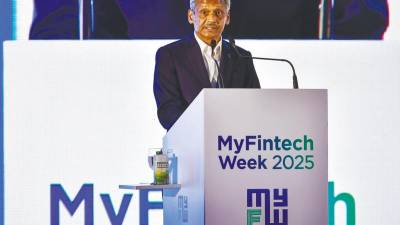KUALA LUMPUR: Bank Negara Malaysia (BNM) is developing regulatory groundwork for three emerging technologies – artificial intelligence, open finance and asset tokenisation – to ensure innovation in the financial sector is responsible, inclusive and trusted.
Governor Datuk Seri Abdul Rasheed Ghaffour said digital assets are increasingly shaping financial services, offering efficiency and new delivery models.
“Their potential is significant and cannot be ignored,” he said in his speech at MyFintech Week 2025 today.
Abdul Rasheed stressed that the central bank is open to innovation that brings genuine value to the economy and supports productive use cases. “But we also remain cautious of developments that introduce undue risks or operate outside the safeguards needed to preserve financial stability and public trust.”
At the same time, he emphasised that the central bank remains open to innovation that brings genuine value to the economy and supports productive use cases.
“But we also remain cautious of developments that introduce undue risks or operate outside the safeguards needed to preserve financial stability and public trust,” he said.
Abdul Rasheed outlined three forthcoming regulatory initiatives as part of BNM’s efforts to prepare the financial system for future trends,
“First, we released a Discussion Paper on Artificial Intelligence today (Tuesday), outlining our regulatory and developmental approach, including priority areas for industry-led collaboration and responsible adoption of AI in financial services.”
Second, Abdul Rasheed said, by year-end this year, it will issue an Exposure Draft on Open Finance to set out the central bank’s vision for a data-driven and customer-permissioned data sharing ecosystem.
Third, BNM will publish a Discussion Paper on Asset Tokenisation outlining potential use cases and safeguards for safe adoption of tokenisation.
Abdul Rasheed said Malaysia’s net-zero targets demand innovative financial solutions, while an ageing population calls for inclusive and forward-looking financial policies in long-term welfare, healthcare and social protection.
“The financial sector is being reshaped by three powerful forces: digitalisation, sustainability and demographic shifts. Technologies such as generative AI and blockchain are transforming business models and redefining consumer expectations.”
On a separate development, the governor said that as Malaysia approaches the final phase of the Financial Sector Blueprint 2022-2026, BNM and the Securities Commission have begun work on the next phase.
“BNM and the Securities Commission have begun work on a new set of priorities and strategies beyond 2026,” he said, adding that BNM is working closely with the SC to align their visions, recognising that Malaysia’s financial future must be built on coherence and shared purpose. The next iteration will ensure our financial system continues to evolve with clarity and ambition,” Abdul Rasheed said.
Looking back, he concluded that the Financial Sector Blueprint 2022-2026 has shaped a more inclusive, resilient and innovation-ready financial sector.
“But the future demands greater agility, deeper collaboration, and bolder thinking,” he said.
